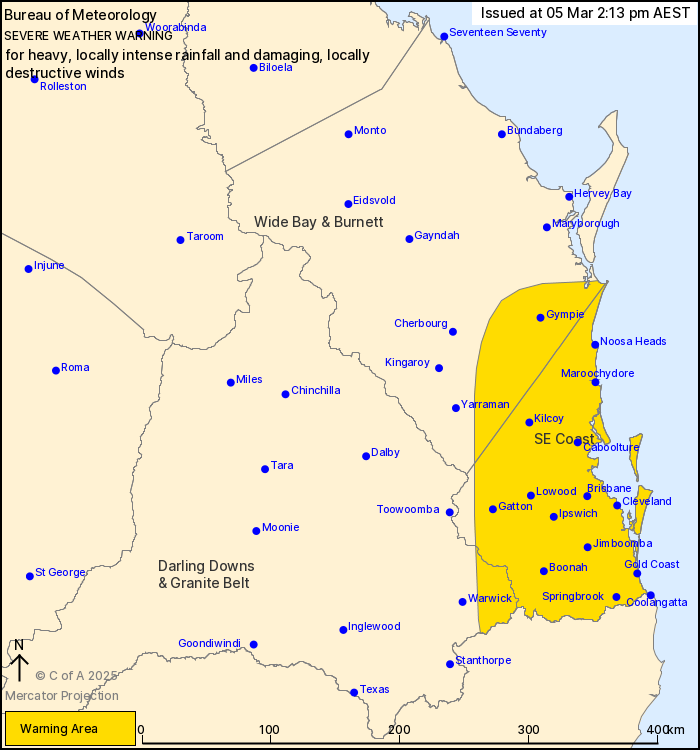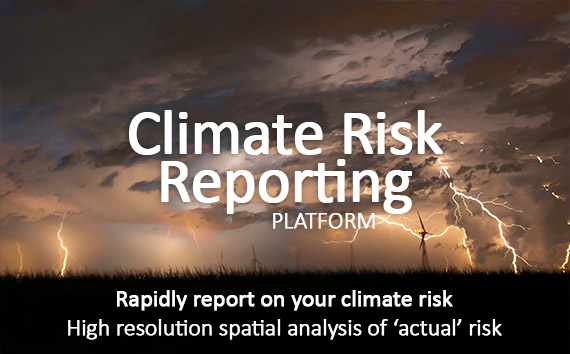Source: Bureau of Meteorology
For people in Southeast Coast and parts of Wide Bay and Burnett
and Darling Downs and Granite Belt Forecast Districts.
Issued at 2:13 pm Wednesday, 5 March 2025.
HEAVY TO LOCALLY INTENSE RAINFALL AND DAMAGING TO DESTRUCTIVE
WINDS EXPECTED OVER SOUTHEAST QUEENSLAND.
Weather Situation: Tropical Cyclone Alfred continues to move west
towards the southeast Queensland coast. This motion will continue
through today with the system expected to make landfall along the
Southeast Coast early Friday morning. Heavy rainfall and damaging
winds will extend well to the south of the centre of the
system.
HEAVY RAINFALL which may lead to FLASH FLOODING is forecast to
develop about parts of southeast Queensland during Thursday.
Six-hourly rainfall totals between 60 and 110 mm and 24-hourly
rainfall totals between 80 and 180 mm are likely. Locally INTENSE
RAINFALL which may lead to DANGEROUS AND LIFE-THREATENING FLASH
FLOODING may develop near and south of the cyclone's centre as it
approaches the coast late on Thursday and persist into Friday, with
possible six-hourly rainfall totals between 200 and 250 mm and
24-hour totals between 300 and 400 mm. These figures are dependent
on the movement and position of the system.
DAMAGING WINDS averaging 60 to 65 km/h with peak gusts to 120 km/h
are likely to develop over the southeast Queensland coastal fringes
and island communities today. These conditions may extend over
inland parts during Thursday. DESTRUCTIVE WIND GUSTS up to 155 km/h
may develop about elevated, coastal and island locations near and
to the south of the system from Thursday afternoon.
A Tropical Cyclone Advice and Forecast Track Map is current for
Tropical Cyclone Alfred.
A Coastal Hazard Warning and Hazardous Surf Warning is
current.
A Flood Watch is current for southeast Queensland.
For these products, see
http://www.bom.gov.au/australia/warnings/
Locations which may be affected include Gold Coast, Brisbane,
Maroochydore, Gympie, Coolangatta and Ipswich.
Emergency services advise people to:
* If you have children make sure they are with you or an adult you
trust.
* Pack away, secure or tie down outdoor furniture, toys and
trampolines if it s safe to do so.
* Park your car undercover away from trees.
* Close doors and windows.
* Keep asthma medications close by. Storms and wind can trigger
asthma attacks.
* Charge mobile phones and power banks in case the power goes
out.
* Put your pets somewhere safe and make sure they can be
identified in case they get lost.
* Do not drive now unless you have to because conditions are
dangerous.
* Tell friends, family and neighbours in the area.
* Go inside a strong building now. Stay inside until the storm has
passed.

05/Mar/2025 04:22 AM



